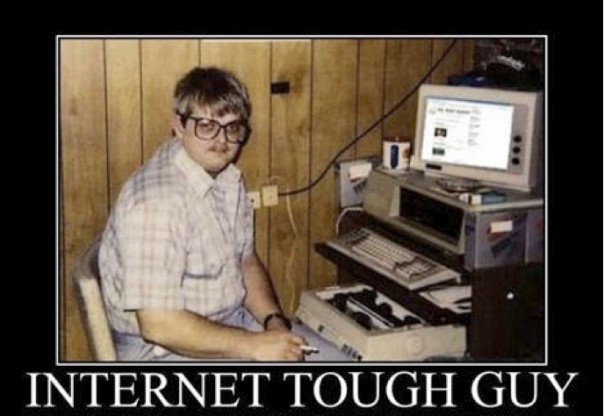Trolls.
They're no longer relegated to the pages of fantasy stories. They are here. They live amongst us.
If you haven't kept up with the lingo, then let me fill you in. When you need the straight-up, down-and-dirty scoop on something, you go straight to the only legitimate source left these days:
Urban Dictionary.
According to Urban Dictionary, a troll is someone "posts a deliberately provocative message to a newsgroup or message board with the intention of causing maximum disruption and argument," or someone who "continually harangues and harasses others." And I like this--a troll is someone "with nothing worthwhile to add to a certain conversation."

We all know trolls. We've seen their work. We've seen their inflammatory comments and posts online. We've scoffed at how anyone could be so ignorant. We've been pulled into completely unproductive debates with them.
I don't want to limit today's post to only trolls, though.
Go onto any article or blog post online that generates decent traffic and comments, and almost every one of them will have great examples of people being reckless with their words. If you really want some examples that will make you want to scrub your eyes and mind clean, find some articles on the Steubenville rape case, or Amanda Knox, or any YouTube video.
Not all of those ignorant posts are by trolls. They're made by your neighbor, your coworker, a member of your family, your friend. They could have been made by you. They could have been made by me.
The internet has made us reckless with our words. There is something about the internet that has taken compassion, grace, and dignity out of what we write and speak to people and to the world. This has to stop.
Rachel Held Evans recently wrote a post recapping her Lent resolution to turn all her hate mail into origami.
One thing she said really stuck out to me as something so many people seem to be missing when we fire away with comments on an article, a blog post, or on social media:
I am a real human being, living a very real life, with a very real capacity to be hurt, to be loved, to heal, and to forgive.
The author of the article on which we comment, the writer of the blog post, and the subjects of those articles are human beings.
The gay people, the Republicans, the Democrats, the President of the United States, the athletes we address on social media are human beings.
They are not characters in a TV show or movie or novel. They are not figments of our imagination. They are not intangible objects or electromagnetic waves that we capture in our modems and cable lines.
They are real people. With real lives. With real flesh. With real hearts.
I've been trying my best to take time every once in a while to reinforce with my eighth-grade students the importance of this issue. I tell them that if what they're posting on Facebook or Twitter isn't something they'd be willing to say to someone's face, then they probably shouldn't post it.
Unfortunately, I know more adults than kids who need to learn this lesson.
Being behind the screen of a computer or phone has taken away two valuable pieces of relational communication--the time to consider what we say, and the look in someone's eyes as they react to our words.
Even if a Christian feels strongly that homosexuality is wrong, I'm fairly sure they would change the way they express their thoughts about it if they were sitting across from someone who is gay. If they were looking right at the very real face of a very real person who could react and respond. If there were very real consequences to the words we spoke.
The same goes for a myriad of scenarios, but this doesn't change: Our words have weight and force. Sometimes those words land as heavy blows for the people to whom they're spoken or about whom they're spoken.
I propose we start a movement--a movement in which we stop hiding in the dark as monsters and step out into the light.
A movement in which we infuse compassion and grace when we speak no matter the medium we use.
A movement in which we consider the weight of our words and their power to either give dignity to people or take it away.
Let's start a movement that does away with trolls. And eliminating the trolls starts with the one hiding in the mirror.


